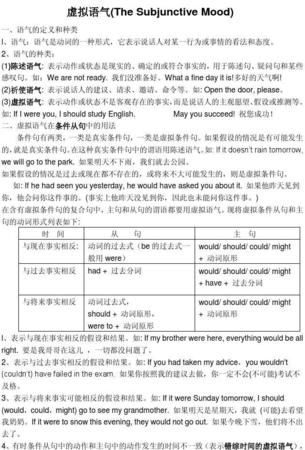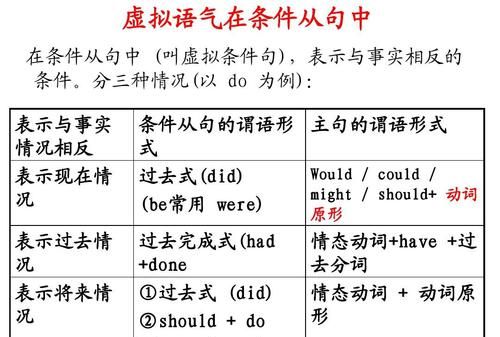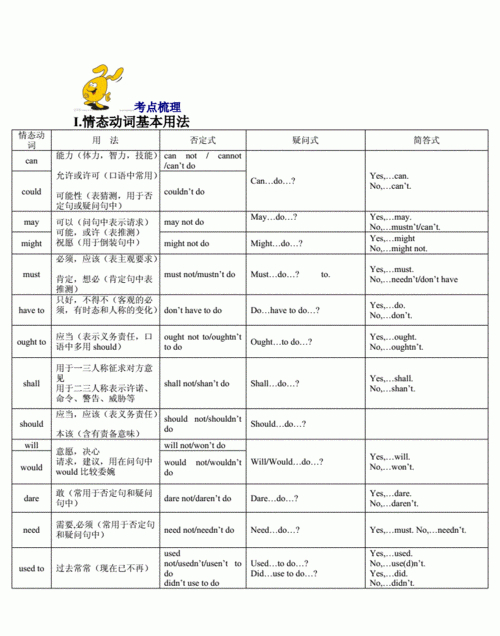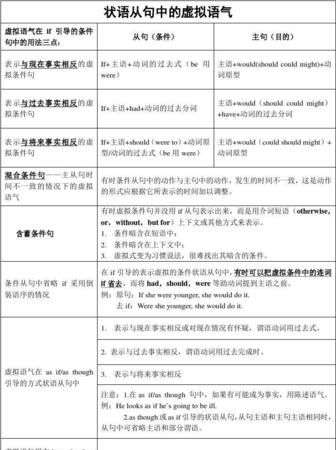本文目录
虚拟语气中的十大动词有哪些英语
order, command, insist, demand, prefer, urge, require, request, ask, recommend, propose, suggest

请大家给我讲下虚拟语气常用的几种形式英语
虚拟语气是一种动词形式,表示说话人的一种愿望,假设,怀疑,猜测, 建议等含义,虚拟语气所表示的含义不是客观存在的事实.它的用法在表情达意的过程中发挥着重要的作用.近几年高考在单项选择这一题型中出现不多,但在完形填空和短文改错中仍然大量出现.例如,2003年高考完形填空第38题考察的就是在篇章语境中的虚拟语气在宾语从句中的用法.虚拟语气的实际用法主要包括以下几种:
1、 虚拟语气用在简单句中,表示“强烈的祝愿或命令的语气”. 常用“May+主语+动词原形”或“主语+动词原形”.例如:May the friendship between us last long. 祝愿我们的友情天长地久. You go out! 你出去!
2、 虚拟语气在宾语从句中的用法.由wish引导的宾语从句常表示说话人的一种强烈的却暂时无法实现的愿望.
How I wish she would be on my side!(But in fact it’s quite impossible.我多么希望她能站在我一边啊!
How I wish I could help him! 我多么希望我能帮助他啊! How I wish I had watched the close NBA game last night.
另外,在表示“命令”、“坚持”、“要求”或“建议”等意义的及物动词(order, command, demand, require, insist, suggest, propose, advise)之后的宾语从句中的谓语动词同样常使用虚拟语气,表示说话人的要求,其结构为:主语+should+动词原形,其中的should常可省略.例如:The head teacher demanded that we (should ) finish the task in time today.
但是,当insist表示“坚持认为”的意思时,或suggest表示“暗示”或“表明”之意时,宾语从句仍用陈述语气.试比较:My parents insisted that I ( should) enter a key university. /My parents insisted that they were right.
The soldier’s pale face suggested that he was happy to have given his life to his motherland.
The monitor suggested that we (should ) hold a class meeting tomorrow afternoon to discuss the problem.
3、 虚拟语气用在主语从句中.
在句型 "It is important (necessary, strange, natural, a pity, suggested, advised, demanded, commanded, ordered ) that . " 中,that 后面的从句中的谓语动词常用:“ should + 动词原形 ”.例如:
It's necessary that we should have a walk now. 我们有必要出去散散步.
It's natural that she should do so. 她这样做是很自然的.
It's suggested that we should take good care of the patient.
同理,在表示“命令”、“坚持”、“要求”或“建议”等意义的名词前后的主语从句、表语从句和同位语从句中的谓语动词同样用虚拟语气,既:“主语+(should)+ 动词原形”的句型.例如:
His suggestion /advice is that we should start early tomorrow morning.
3、虚拟语气用在状语从句中.
虚拟语气最多地用在表示条件的状语从句和表示结果的主句中.在表示与事实相反的虚拟语气时,动词有三种虚拟形式,即虚拟条件现在式,过去式和将来式.
1) 虚拟条件现在式:表示与现在事实相反的假设及根本不可能的假设或结果:
条件状语从句
结果主句
If 主语+ 动词过去式(be 用were)
主语+ would/could/should/might + 动词原形
2)虚拟条件过去式:表示与过去事实相反的假设或结果:
条件状语从句
结果主句
If+主语+ had + 过去分词
主语+should/ would/could/might+ have+ 过去分词.
3)虚拟条件将来式:表示与将来事实相反的假设或结果:
条件状语从句
结果主句
If+ should /were to +动词原形
主语+ should/ would/could/might+动词原形
If I were you, I should get it. 如果我是你,我就买了它.
If I had time now, I would study French. 如果我现在有时间,我会学习法语的.
If you had got up earlier, you could have caught the train. 如果你早一点起床,就会赶上火车的.
If it were to be fine tomorrow, I would go shopping with my friends.
如果明天天气好,我将和朋友们一起去买东西.

从句中用虚拟语气的动词
01.表示与现在事实相反的假设
从句: if+主语+were或动词过去时
主句:主语+ should/would/could/might+动词原形
02.与过去事实相反的假设
从句: if+主语+had+过去分词
主句: 主语+ should/would/could/might+have+过去分词
03.表示与将来事实相反的假设
从句 if+主语+should/ were to/动词过去时
主句 主语+ should/would/could/might+动词原形

哪些词后面用虚拟语气
现代英语中,通用的动词虚拟式只有两个,即be型虚拟式和were型虚拟式。所谓be型虚拟式,是指不管主语是什么人,动词一律用原形,如果动词是被动态形式,则助动词一律用be。所谓were型虚拟式,是指不管主语是什么人称,动词一律用were,动词是进行时或被动态时,助动词一律用were。
be型虚拟式
1.用于表示命令、决定。建议等词语后的that分句。例如:Mary insisted that John come. /He ordered that the books be sent at once.
2.用于if,though,whatever,lest等引导的分句中,表示推测、让步、忧虑等。例如:Though everyone desert you,I will not. /If John be found guilty,he shall have the right of appeal.
3.用于某些表示祝愿、诅咒、禁止等以及公式化的语句中。
例如:
God bless you! /Heaven forbid!
were型虚拟式
1.用于wish后的that分句中,表示与现在的事实相反的主观设想。例如:
I wish I were there.
I wish it were spring all the year round.
2.用于if,as if,as though等引导的分句和suppose或imagine等后面的分句中,表示对现在时间或将来时间的主观设想。例如:
If I were you,I should wait till next week.
He spoke to me as if I were deaf.
If it were to rain,we should get wet.
1.动词suggest,order,demand,propose,request,command,insist等后的宾语从句中,用虚拟语气(即Should+动词原形或只用动词原形)来表示愿望、建议、命令、请求等。在动词wish /would rather后的宾语从句中,用过去式表示与现在事实不符,用过去完成式表示与过去事实不符。
e.g. I suggest that we(should)set off at once.
The doctor insisted that the patient (should)be X-rayed.
I wish I were as strong as you.
I would rather that you hadn't told him.
2. 在 suggestion, proposal,idea,plan,order,advice等名词后的表语从句、同位语从句中要用虚拟语气,即should+动词原形或只用动词原形。如:
Our suggestion is that you( should)be the first to go.
My advice is that we(should)send for Doctor Li.
Do you know the order that you(should)keep watch?
3. 在It is necessary/important/strange/natural;It is requested/suggested/desired/proposed;it is a pity等结构后的主语从句中要用虚拟语气,即Should+动词原形或只用动词原形。如:
It is necessary that he(should)be sent there at once.
It is requested that Professor Li(should)give us a speech.
It is desired that we(should)get everything ready by tonight.
4. 在as if引导的状语从句中,用过去式表示与现在事实不符,用过去完成式表示与过去事实不符;They talked as if they had been friends for years.
5. 在so that,in order that引导的状语从句中,(根if状语从句中的主句形式相同)常用should/would/could/might+动词原形来表示虚拟语气。如:
She stayed at home for a few days so that she could take care of her mother.
He took a taxi to the station so that she should not miss the train.
6.在it is time后面的定语从句中常用过去式表示虚拟。
It’s time I was going.
It’s time somebody taught you to behave yourself.
7. 由wish引起的表示愿望的虚拟语气
A.用wish表示对现在的愿望时,它所引起的宾语从句中谓语动词形式为:过去式(be动词用were)。
B.用wish表示对将来的愿望时,它所引起的宾语从句中谓语动词形式为:would, could, might+ 动词原形。
C.wish用于对过去的事实表示一种不可能实现的愿望时,宾语从句中的谓语动词形式为:had+动词过去分词或could, would + have +动词过去分词。
I wish that he weren’t so lazy.
I wish I hadn't wasted so much time.
I wish she would change her mind.
8. had hoped/ planned/ thought/ wanted/ intended表示一种过去未实现的愿望或令人失望的事。
I had thought he had been dead for at least 20 years.
I had hoped that she would go to the U.S. and study there, but she said
she liked to stay in China.
9. would rather.( 与if 从句相同)
would (had) rather, would as soon, would sooner和would prefer所引起的从句中要求用过去式表示当时或将来的情况,用过去完成时表示过去的情况,表示希望或婉转的责备。例如:
I’d rather you posted the letter right away. 我倒希望你把这封信立刻寄出去。
I would prefer he didn’t stay there too long.我倒希望他不要在那儿可得太久。
I would just as soon you had returned the book yesterday.我真希望你昨天把这本书还了。
10. 虚拟语气在由某些连词,常见的这些连词和介词有:与if 从句相同
1) unless (除非),provided(倘若),supposing(假若),providing(倘若) , on condition that(如果),由这些词、词组引出的从句,动词多用过去时。
除非你命令他做,要不他是不会做的。
He wouldn't do it unless you ordered him to.
假若你有机会出国,你会去哪儿呢?
Providing(if) you had the opportunity to go abroad, where would you go?
11. for fear that(以免, 唯恐),in order that (以便),whether(不管),lest(以免),in case (假使),从句中加情态动词,有时should可省略。
他把它藏起来以免她看见。
He hid it lest she (should) see it.
我得准备点啤酒,说不定约翰会来。
I'll get some beer in case John should come.
他轻轻地进屋,以免吵醒他的同房。
He entered the room quietly in order that he should not wake his roommate.
12. if only, 与if 从句相同
如果表示对现在的愿望,句中的谓语动词常用过去式;
如果表示将来的愿望,句中的谓语动词常用would/could+动词原形;
如果表示对过去的愿望,句中的谓语动词常用had+过去分词。
if only I were you!
If only you had come yesterday!
If only Linda could go with us tomorrow!
If only I had said more about it!
还有最常见的就是if 条件句了,你应该挺清楚了吧。就不写了。

以上就是关于2个引导虚拟语气的动词 ,虚拟语气中的十大动词有哪些英语的全部内容,以及12个引导虚拟语气的动词 的相关内容,希望能够帮到您。

